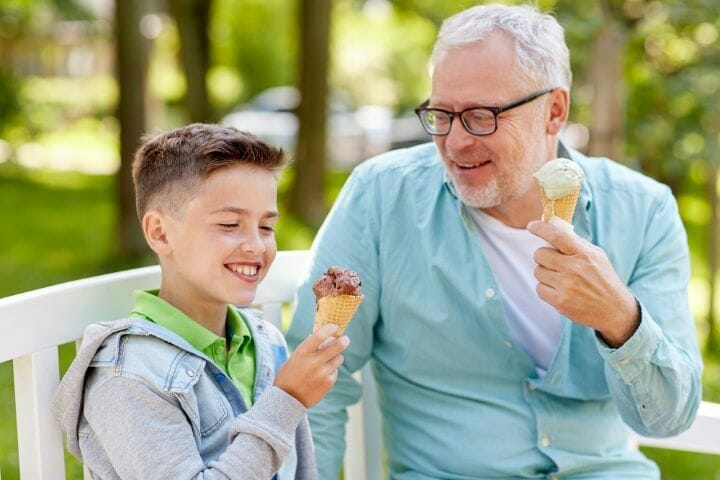There’s nothing quite like catching up with a friend over a good cup of coffee – you can easily lose track of time and chat for hours. Coffee brings us together, reminds of us our laughter around a dinner table and those early hours of the morning when the house is totally quiet and you’re enjoying the silence.
As with most things, our doctors will remind us that some things just aren’t that good for us – especially as we age.
For specific reasons, doctors may recommend that people take it easy on their coffee intake but does that mean it’s bad for all seniors to drink coffee as part of their regular day? How much coffee is too much?
Here’s what you need to know about coffee and seniors, and whether it’s good to keep drinking.
Contents
The Benefits of Coffee
Most people who drink coffee equate it with that rich smell as it’s brewing and that jolt to wake you up first thing in the morning – or they may think of nights with family around the table and a good conversation with a friend or curling up with a good book.
No matter when you drink your coffee, or how, chances are it’s a positive memory for you and something you enjoy as part of your everyday routine.
In addition to that wonderful aroma of coffee brewing in the morning made from your favorite coffee maker and coffee mugs, coffee can actually increase your cognitive function and, in moderation, reduce the risk of chronic conditions like Parkinson’s, type 2 diabetes, depression and even some liver diseases.
There is some evidence to show that a few cups of coffee a day (without sugar or cream in it, though) can actually reduce your risk of developing type 2 diabetes by up to 25%. It also works to prevent, or even just slow, the development of Parkinson’s and its effects.
On top of that, there is reason to believe those same few cups of coffee drank during midlife can actually decrease the risk of dementia in your later years. These benefits, though, are associated with drinking a dark roast coffee and not just about the caffeine content in the coffee being drank.
Seniors that drink between one and four cups of coffee every day are also much less likely to suffer from a cardiovascular event (like a heart attack) or even develop cardiovascular disease.
Overall, it would seem that drinking coffee actually isn’t that bad for seniors right? Well, like everything it needs to be consumed in moderation and there are a few downsides to drinking coffee for seniors with specific conditions or even just drinking too much of it.
You may also like How Can Seniors Increase Their Energy Levels
The Downside to Coffee
For most seniors, drinking coffee – and therefore consuming caffeine in moderate amounts – isn’t bad for them there can be some serious side effects for certain people or those who consume too much coffee on a regular basis.
Seniors who drink more than 4 cups of coffee on a regular basis may experience headaches, anxiety, general restlessness and even heart palpitations. Having too much caffeine on a regular basis will overstimulate the nervous system, and that is responsible for the jitters and restlessness – sometimes even major stomach issues.
Why does this happen, specifically in the elderly? Some studies have shown that seniors can take up 33% longer to metabolize caffeine in their body so it will affect their nervous system for longer than young adults.
For example, some elderly people will say they cannot drink coffee after a certain time and you might wonder why. Well, if your elderly parent has coffee at 4 pm their body is likely still processing it at 10 pm which means it could be keeping them up at night or preventing restful sleep.
Another side effect of caffeine is an increase in blood pressure. For younger adults that might not be an issue but for seniors – who may have a medical condition dealing with blood pressure – it could drastically impact them. On top of that, those who drink too much coffee can experience slight dehydration, leading to more headaches. If seniors are drinking coffee when thirsty, instead of water, then this will contribute to dehydration.
On top of those side effects, too much coffee can actually cause issues with your stomach lining – especially for those who already have ulcers or gastritis.
Additionally, coffee can impact the effectiveness of certain medications that seniors maybe, like antidepressants and thyroid medications. In other cases, too much coffee can amplify the effects of certain medications which will further increase the jitters or even heart palpitations.
You may also like Best Non Plastic Water Filter Pitchers
It Isn’t Just about Coffee
While we often think of coffee as the source of caffeine in our diet, that doesn’t mean it isn’t found in other foods.
Sometimes we are consuming a whole lot more caffeine than we think we are due to the other foods we’re eating. If your doctor has told you to avoid, or even just watch, caffeine intake here are some other foods that you might want to consider removing from your diet (or having in very, very limited amounts).
- Chocolate
- Tea (unless indicated it’s non-caffeinated)
- Ice cream and frozen yogurt
- Pudding
- Hot chocolate
- Sodas
- Energy waters
- Some pain relievers
- Protein bars
Now each of these items may vary, and there could very well be options for you to consume that do not have (a lot of) caffeine in them. If you have questions about any specific item, you can always ask your doctor about the best options for you and what you should be consuming.
Eating one of these food items alone will not likely make a big difference for you, however when you combine all of these items and knowing you may consume more than one of them on a daily basis in addition to cup(s) of coffee in the morning you could be consuming much more caffeine than you think you are.
You may also like Best Brain Supplements for Elderly
So, How Much Caffeine Should You Have Daily?
Well, that answer is difficult as it isn’t always the same for everyone. Typically, a healthy amount of caffeine for an adult is around 400 milligrams per day. This works out to be about 4 cups of brewed coffee every day, but that does not include any caffeine you may get from other foods (like mentioned above).
If you’re exceeding that much caffeine, from all sources, you may want to think about finding ways you can cut back on your intake. If you are a caregiver for a senior who seems to be drinking a lot of coffee instead of water then you should consider switching this up in their diet.
Making sure you stay below the recommended intake of caffeine can help make sure you avoid any unwanted side effects and it can help to avoid insomnia.
How to Break the Habit
While coffee is a socially acceptable thing to drink, and it’s completely legal, it’s still considered a stimulant. Over time, people who drink a lot of coffee can actually become addicted to drinking it, and they need increasing amounts of caffeine to get their “fix” or feel the appropriate side effects they’re looking for (like helping people to wake up).
Since seniors have likely being drinking coffee for most of their life, they will probably have a difficult time breaking this habit. It’s a social thing to chat with friends over coffee and so trying to get rid of this from their life will be difficult, as they will likely want to continue to spend time socially with their friends.
When anyone goes through withdrawal from coffee, they may experience headaches, fatigue, irritability and lack of concentration. For seniors – especially those who are used to drinking a lot of coffee in a day – these side effects can be that much more pronounced so it’s important to slowly decrease the amount of coffee a senior drink over time instead of just suddenly removing it from their diet.
During the process of weaning off of caffeine, having healthier alternatives on hand can help minimize the side effects of withdrawal. Drinks like Kombucha drinks that have antioxidants probiotics combined with coconut water (that contains electrolytes) can help prevent the dehydration that happens with consuming too much coffee.
These drinks can be found in almost every grocery store – usually in the health food or organic section – so you could have a few on hand to drink instead of coffee when you get thirsty throughout the day.
On top of that, drinking water with a slice of lemon is very refreshing if you find that drinking just plain water isn’t something you like. If you find you are missing just the taste of coffee, you can add in smoothies with a coffee flavor that does not have caffeine in them.
On top of that, if you are trying to reduce the amount of coffee you drink try putting away the coffee maker when you’re done with it as keeping it out and brewing all day makes it far too easy to just keep filling up your cup.
For most seniors, it’s totally fine to continue to enjoy a cup or two of coffee in the morning but try your best to avoid drinking it all day. If you have concerns about any of your health conditions and what it could mean for you specifically in drinking coffee you should contact your doctor and determine what is right for you.





